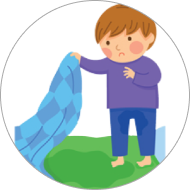BED WETTING
Sleep dysfunctions in children can contribute to bedwetting (nocturnal enuresis) by disrupting the body’s ability to regulate bladder control during sleep. Several mechanisms link sleep problems and bedwetting:
- Disrupted Sleep Architecture
- Obstructive Sleep Apnea (OSA)
- Delayed Maturation of Bladder Control
- Sleep Fragmentation and Stress
- Decreased Sleep Quality and Physical Development
- Night Terrors or Sleepwalking
- Sleep Disorders and Urinary Problems
Addressing the underlying sleep dysfunctions—whether through treatments for conditions like sleep apnea or behavioral changes to improve sleep hygiene. It has been expressed by some that Bed Wetting creates a reflex act in connection to Sleep Apnea to stimulate lost respiration. Correcting the Sleep Apnea can often help reduce or resolve bedwetting episodes in children.
1. Disrupted Sleep Architecture
- Deep Sleep and Bladder Signals: Children who experience deep, uninterrupted sleep may not wake up in response to the bladder’s signals to urinate. Sleep dysfunctions, such as sleep apnea or other disturbances, can either deepen sleep to the point where the child doesn’t wake up or fragment sleep, which affects the body’s normal signals that alert the brain when the bladder is full.
- Sleep Arousal Threshold: Some children with sleep dysfunctions have a higher arousal threshold, meaning they do not wake up easily when their bladder is full. This inability to wake up in response to a full bladder leads to involuntary urination during the night.
2. Obstructive Sleep Apnea (OSA)
- Breathing Disruptions and Hormonal Imbalance: Children with obstructive sleep apnea experience repeated breathing interruptions during sleep, which leads to fragmented sleep. OSA is associated with reduced levels of antidiuretic hormone (ADH), which normally helps the body produce less urine at night. Reduced ADH levels can cause an overproduction of urine, overwhelming the child’s ability to control urination during sleep.
- Stress on the Body: The physiological stress caused by OSA, including frequent awakenings and reduced oxygen levels, can affect the nervous system’s ability to control bladder function at night.
3. Delayed Maturation of Bladder Control
- Neurodevelopmental Delays: Sleep dysfunctions may affect the development of brain regions responsible for bladder control, especially in younger children. These delays may prevent the maturation of the bladder-brain connection, leading to bedwetting.
- Slow Maturation of Sleep-Wake Systems: In children with sleep dysfunctions, the normal development of the sleep-wake cycle may be slower, making it more difficult for them to wake up when the bladder signals it is full.
4. Sleep Fragmentation and Stress
- Emotional Stress and Anxiety: Sleep dysfunctions, especially those associated with stress, anxiety, or other emotional disorders, can exacerbate bedwetting. Stress impacts bladder control and the ability to wake up in response to bladder signals. Anxiety-related sleep issues may trigger bedwetting episodes, especially in children who already have a predisposition to enuresis.
- Increased Cortisol Levels: Sleep disturbances can raise cortisol levels (the stress hormone), which may interfere with normal bodily functions, including bladder control.
5. Decreased Sleep Quality and Physical Development:
- Poor Sleep and Muscle Control: Children with sleep dysfunctions often have poor muscle tone, including in the muscles that control the bladder. Low muscle tone during sleep can make it difficult for the bladder to retain urine overnight, leading to bedwetting.
- Delayed Circadian Rhythms: Circadian rhythm disruptions, common in sleep dysfunctions, may affect the body’s normal cycle of urine production. In children, a disrupted circadian rhythm may cause the bladder to produce more urine during the night, leading to bedwetting.
6. Night Terrors or Sleepwalking:
- Parasomnias and Bedwetting: Children who experience parasomnias, such as night terrors or sleepwalking, may be more prone to bedwetting. These episodes can occur during deep sleep, and because the child is not fully conscious, they may not recognize the need to urinate or may urinate involuntarily during the episode.
7. Sleep Disorders and Urinary Problems:
- Restless Leg Syndrome (RLS): Children with restless leg syndrome or periodic limb movement disorder often experience fragmented sleep. This may lead to bedwetting because they do not enter restorative sleep cycles where bladder control improves.
- Frequent Nighttime Wakings: Sleep dysfunctions can cause frequent awakenings, which disrupt the normal patterns of bladder control. In children who have trouble falling back asleep, the body’s mechanisms for urine regulation may be affected, leading to bedwetting.
Addressing the underlying sleep dysfunctions—whether through treatments for conditions like sleep apnea or behavioral changes to improve sleep hygiene. It has been expressed by some that Bed Wetting creates a reflex act in connection to Sleep Apnea to stimulate lost respiration. Correcting the Sleep Apnea can often help reduce or resolve bedwetting episodes in children.

